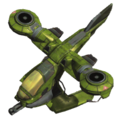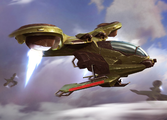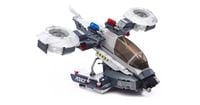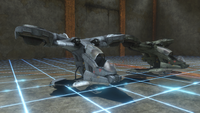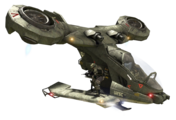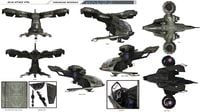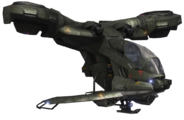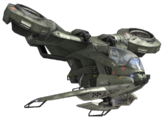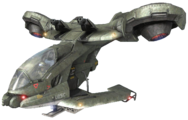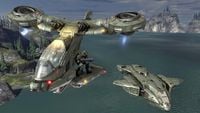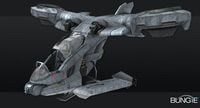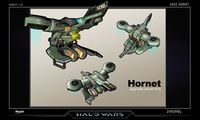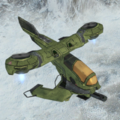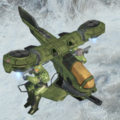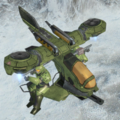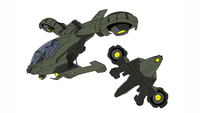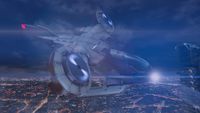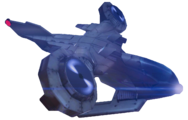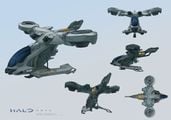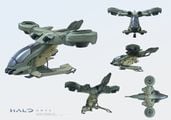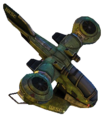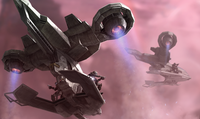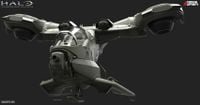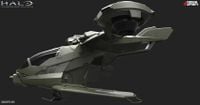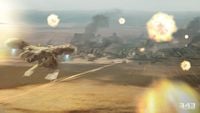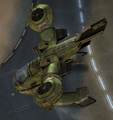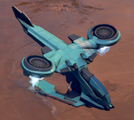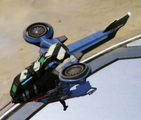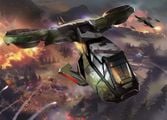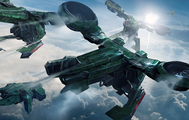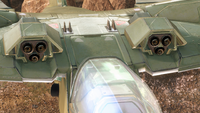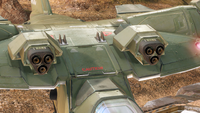AV-14 Hornet: Difference between revisions
From Halopedia, the Halo wiki
(→Trivia) |
Sith Venator (talk | contribs) |
||
| (621 intermediate revisions by more than 100 users not shown) | |||
| Line 1: | Line 1: | ||
{{ | {{Status|Canon}} | ||
{{ | {{Center|''Were you looking for the [[M441 Hornet Remote Explosive System]], a nuclear weapon used by the UNSC?''}} | ||
{{ | {{Vehicle infobox | ||
|image= [[ | |image=[[File:H2A AV-14Hornet.png|300px]] | ||
|name=Hornet | |name=AV-14 Hornet | ||
|manufacturer= | |manufacturer=[[Misriah Armory]]<ref name="HTEVG">'''[[Halo: The Essential Visual Guide]]''', ''page 96''</ref> | ||
|line= | |line= | ||
|model= | |model=AV-14 | ||
|class= | |class= | ||
|length={{Convert|9.6|m|ft}}{{Ref/Reuse|HTEVG}} | |||
|width={{Convert|8.7|m|ft}}{{Ref/Reuse|HTEVG}} | |||
|width= | |height={{Convert|4.45|m|ft}}<ref>'''Halo 3''', ''3D model data''</ref> | ||
|height= | |mass= | ||
|max accel= | |max accel= | ||
|max speed air= | |max speed air= | ||
|engine=Turbofan/turbojet engine | |||
|engine= | |||
|power= | |power= | ||
|shield gen=None | |shield gen=None | ||
| Line 30: | Line 23: | ||
|avionics= | |avionics= | ||
|countermeasures= | |countermeasures= | ||
|armament=*[[Class-2 Guided Munition Launch System]] | |armament=*Two [[Class-2 Guided Munition Launch System]]s | ||
* | *Two twin-linked rotary cannons {{C|standard}} | ||
* | *One nose-mounted [[GUA-23/AW/Linkless Feed Autocannon]] {{C|variant}} | ||
|complement= | |complement= | ||
|crew= | |crew=One pilot | ||
|skeleton= | |skeleton= | ||
|passengers= | |passengers=Four | ||
|capacity= | |capacity= | ||
|consumables= | |consumables= | ||
|othersystems= | |othersystems= | ||
|firstuse=[[ | |firstuse-title=In service | ||
|role= | |firstuse=[[Insurrection]] <br> | ||
[[Human-Covenant War]] <br> | |||
[[Post-Covenant War conflicts]] <br> | |||
|role=Close air support,<ref>[http://halo.bungie.net/News/content.aspx?type=topnews&cid=13368 '''Bungie.net''': ''Bungie Weekly Update: 3/14/08'']</ref> light troop transport, light anti-vehicle/personnel | |||
|affiliation= [[United Nations Space Command]] | |affiliation=[[Colonial Military Authority]]<ref name="HLL">'''[[Halo: Last Light]]'''</ref> | ||
<br>[[United Nations Space Command]] | |||
}} | }} | ||
The '''AV-14 Hornet''', more formally known as the '''AV-14 Attack VTOL''', is a [[United Nations Space Command]] airborne assault vehicle. | |||
The | ==Overview== | ||
===Design details=== | |||
The AV-14 is a vertical take off and landing vehicle (VTOL) that has been in service since the [[Insurrection]],<ref>'''Halo Legends''', ''Origins''</ref> at least as early as [[2524]].<ref name="enyc">'''[[Halo Encyclopedia (2009 edition)]]''', ''page 248''</ref><ref name="evo">'''Halo: Evolutions - Essential Tales of the Halo Universe''', "Dirt", ''page 113''</ref> It serves as the UNSC's primary assault, search and reconnaissance, and close air support aircraft. The Hornet is an atmospheric craft and as such cannot be deployed by orbital vessels unless a ship rated for atmospheric entry can deliver it to the battlefield. It is easier for the Hornet to be deployed from an air base located on the surface than from a ship. | |||
= | The AV-14 Hornet consists of a one-man cockpit and a rear section, extending approximately one meter backward. Variant models feature a tandem seating configuration, presumably allowing a second passenger to operate the aircraft's weaponry or navigation systems.<ref>'''Halo Legends''', ''Homecoming''</ref> At the top of this rear section are a set of wings with what appear to be advanced turbofan engines mounted on gimbals at the ends, providing the Hornet's main source of propulsion. The front of the Hornet contains a target acquisition and designation system which includes cameras and sensors. On each side of the cockpit is a jump-seat extending backward that doubles as a landing skid. These skids allow up to four passengers.<ref name="harv">'''Halo: Contact Harvest''', ''page 9''</ref> | ||
Although the AV-14 Hornet primarily serves as an attack craft, the Hornet can be reconfigured for a number of other roles. For example, some AV-14s are configured as dedicated troop transports. These Hornets lack the Class-2 Guided Munitions Launch System equipped by the standard model in order to improve airspeed.<ref>'''Halo 3''', multiplayer level, ''[[Avalanche]]''</ref> | |||
===Armaments=== | |||
The AV-14 Hornet is armed with both anti-infantry and anti-vehicle weapon systems. The AV-14 Hornet can be configured with one of two anti-infantry systems. The first configuration contains two triple-barreled, fire-linked rotary cannons. These are located on either side above the cockpit on the leading edges of the wing. The guns fire synchronously, and can be elevated and depressed to a small degree, without affecting the flight pattern of the Hornet. The second is a single, nose-mounted [[GAU-23/AW/Linkless Feed Autocannon]] that fires .50 BMG ammunition.{{Ref/Reuse|evo}}<ref>'''Halo Wars'''</ref><ref name="wars">'''[[Halo Wars: Official Strategy Guide]]''', ''page 45''</ref> The anti-vehicle system is composed of two [[Class-2 Guided Munition Launch System]]s that are mounted on the ventral surface of the aircraft's landing skids. When triggered, each pod fires a single missile. Like the [[LAU-65D/SGM-151 missile pod]], the Class-2 GMLS is capable of achieving a target lock. In addition the Hornet can be armed with two chaff pods to counter radar-guided missiles. These are copper nickel-coated glass fibers or silver-coated nylon fibers having lengths equal to half of the anticipated radar wavelength.{{Ref/Reuse|wars}} | |||
===Usage=== | |||
The AV-14 Hornet is known for its efficiency in combat situations; its multi-purpose role allows the vehicle to take on a wide array of missions and can perform without any major problems. In its role as an attack craft the AV-14 is very effective at hunting down and destroying armor with relative ease; the homing Class-2 GMLS can take down the toughest Covenant armor in only a few strikes, making it the UNSC's prime choice for hunting down tanks, aside from the [[AV-22 Sparrowhawk]]. Its ability to engage infantry also makes the AV-14 both an offensive and defensive aircraft; the triple-barreled rotary cannons can destroy heavily armored and heavily shielded targets with little effort, and its ability to place itself in a stationary position to lay down cover fire while a larger craft retrieves fellow infantry also allows it to perform its role as a support craft. The firepower of the craft is a major asset when escorting other aircraft which could be susceptible to ground fire into dangerous territory. Its role as a support craft is further bolstered by its ability to easily insert small strike teams into combat situations. | |||
While the AV-14 Hornet has a wide variety of roles and advantages, its greatest weakness is its light armor — making it susceptible to anything larger than small arms fire.{{Ref/Reuse|enyc}} Although the Hornet is rather nimble, it lacks the maneuverability of the [[D77-TC Pelican]] and the AV-22 Sparrowhawk, which can occasionally be a liability in combat conditions. Infantry atop of vehicles landing skids are also at risk of taking enemy fire, as they have no protection at all, which is why the AV-14 Hornet is often used to insert small strike teams, but not to extract them, in combat operations.{{Ref/Reuse|evo}}<ref>'''Halo: Contact Harvest''', ''page 20''</ref> The risk of casualties from anti-aircraft fire mandates the use of more heavily armored aircraft like the D77-TC Pelican or the [[UH-144 Falcon]] for extraction. | |||
* | ==Variants== | ||
*'''2531 Hornet''': Deployed by the crew of the {{UNSCShip|Spirit of Fire}} during the [[Harvest campaign]] through to the [[Battle of Trove]], this variation has a large rotary cannon built into the nose of the aircraft, rather than the two guns on later models.{{Ref/Reuse|wars}} | |||
*'''AV-14B Attack VTOL''': Modified by the crew of UNSC ''Spirit of Fire'' for deployment against the [[Banished]], this model is used for combat reconnaissance and surprise attacks on high-priority targets. The AV-14B is armed with medium autocannons that are effective against all targets, and are particularly adept at taking out light vehicles. It features a modified airframe that is considerably blockier in shape than the base model.<ref name="art of war">[https://www.halowaypoint.com/en-us/news/the-art-of-war-s '''Halo Waypoint''' - ''Canon Fodder: The Art of War(s)'']</ref> | |||
*'''NMPD Hornet''': An air support variant of AV-14 utilised by the [[New Mombasa Police Department]]. This variant is painted in black and white livery, and has blue and red lights.<ref name="Air Support Hornet">[https://www.megaconstrux.com/en-us/worlds/halo/playsets/police-air-support-hornet-97429 '''Megabloks''' ''- Police Air Support Hornet'']</ref> | |||
*'''Transport Hornet''': A transport-orientated variant of the Hornet. This variant has the missile pods removed and a white paint coating. | |||
<gallery> | |||
File:HWunit Hornet.png|2531 Hornet | |||
File:HW2 Blitz Hornet.png|AV-14B Hornet | |||
File:MEGA_NMPD_Hornet.jpg|NMPD Hornet | |||
File:H3_Sandbox_Hornets.png|A transport Hornet (left) and a regular AV-14 (right). | |||
</gallery> | |||
==Gameplay== | |||
{{Main|Hornet}} | |||
The Hornet is a drivable vehicle in two games including ''[[Halo 3]]'' and ''[[Halo 2: Anniversary]]''. They are also units in ''[[Halo Wars]]'' and ''[[Halo Wars 2]]''. | |||
* | ==Trivia== | ||
{{Linkbox|gameplay=yes|gallery=yes}} | |||
*A hornet is an insect, in keeping with the UNSC's tradition of naming atmospheric vehicles after real animals with the exceptions of the [[GA-TL1 Longsword]], [[B-65 Shortsword]], [[F-41 Broadsword]], and [[FSS-1000 Sabre]], which are named after bladed weapons and are capable of space flight. | |||
*The Hornet bears a slight resemblance to its namesake insect with the "wings" growing slightly wider towards the end (like a real hornet's wing) and with the personnel jump seats mimicking the long back legs that often trail behind the posterior of the insect. | |||
*In ''Halo Wars'', when the "Wingmen" upgrade is unlocked for the Hornet, the Marines sit on the wings instead of stand as they do in ''Halo 3'', due to the scaling of the two units. Such scaling differences are common in real-time strategy games. | |||
== | ==Gallery== | ||
[[ | <gallery> | ||
File:ODST Fast roping.png|A flight of Hornets deploy ODSTs into the occupied city of Cleveland on Earth in 2552 in ''[[Halo: Uprising]]''. | |||
File:H3_Hornet_Concept.png|An early Hornet concept for ''[[Halo 3]]'', with a gunner being placed on the back. This idea was later abandoned. | |||
File:AV-14 Hornet.png|The AV-14 Hornet in ''Halo 3''. | |||
File:H3 AV-14.jpg|Turnaround reference of the AV-14 Attack VTOL as seen in ''Halo 3''. | |||
File:H3 AV-14 Hornet-crop.png|View of an unoccupied AV-14 Hornet in ''Halo 3''. | |||
File:H3-AV14Hornet01.png|View of an AV-14 Hornet with guns pointed downward. | |||
File:H3-AV14Hornet02.png|View of an AV-14 Hornet with Guns pointed upward. | |||
File:Halo-3-The-Covenant-20-HORNET.jpg|A Hornet and a Pelican. | |||
File:H3_SnowHornet.jpg|The snow-camouflaged Hornet on the map ''[[Avalanche]]''. | |||
File:HW_Hornet_Concept.jpg|Concept art of the Hornet for ''[[Halo Wars]]''. | |||
File:HW Renders Hornet.jpg|Hornet with a chin-mounted gun in ''Halo Wars''. | |||
File:HW-AV14.png|A Hornet on [[Harvest]]. | |||
File:HW-AV14wingmen.png|A Hornet with two Marine passengers. | |||
File:HW-AV14chaffpod.png|A Hornet with chaff pods. | |||
File:Homecoming_Hornet_Concept.png|Tandem-seater variant of the AV-14 Hornet as seen in ''[[Halo Legends]]: [[Homecoming]]''. | |||
File:AV-14 Hornet.jpg|A Hornet in the background of [[Skyline (level)|Skyline]] in ''[[Halo 4]]''. | |||
File:H4 AV-14 Hornet.png|Close-up view of the AV-14 Hornet in ''Halo 4''. | |||
File:H4_Hornet_Concept_1.jpg|Concept art of the ''Halo 4'' Hornet. | |||
File:H4_Hornet_Concept_2.jpg|Concept art of the ''Halo 4'' Hornet. | |||
File:HSA-AV14Hornet-Render.png|A cutout of a Hornet in ''Spartan Assault''. | |||
File:Hunt for the Phantom.png|A squadron of Hornets pursue Covenant forces during the [[Battle of Draetheus V]]. | |||
File:H2AMP Hornet Render 1.jpg|Render of the Hornet model in ''Halo 2: Anniversary''. | |||
File:H2AMP Hornet Render 2.jpg|Side render of the Hornet model. | |||
File:HSS-Cinematic-Oscar Mike.jpg|A Hornet flying towards a city in ''[[Halo: Spartan Strike]]''. | |||
File:SS Hornet.png|In-game model of the Hornet in ''Halo: Spartan Strike''. | |||
File:HW2B Hornet.png|An AV-14B Hornet in the ''[[Halo Wars 2 Open Beta]]''. | |||
File:AV-14B Halo Wars 2 Blitz Beta.png|A Trooper AV-14B Hornet in the ''[[Halo Wars 2 - Blitz Beta]]''. | |||
File:HW2 - AV-14B Hornet.jpg|Blitz card of a Trooper AV-14B in ''[[Halo Wars 2]]''. | |||
File:HW2 Hornets and Vulture.png|Title card art from a cut ''Halo Wars 2'' mission featuring AV-14B Hornets and an [[AC-220 Vulture]]. | |||
File:H2A Hornet Guns retracted.png|The Hornet's guns retracted on ''Halo 2: Anniversary''. | |||
File:H2A Hornet Guns deployed.png|The Hornet's guns deployed on ''Halo 2: Anniversary''. | |||
</gallery> | |||
== | ==List of appearances== | ||
* | *''[[Halo: Uprising]]'' {{1st}} | ||
* | *''[[Halo 3]]'' | ||
* | *''[[Halo: Contact Harvest]]'' | ||
* | *''[[Halo Wars]]'' | ||
* | *''[[Halo 3: ODST]]'' {{C|Halo: The Master Chief Collection only}} | ||
* | *''[[Halo Legends]]'' | ||
* | **''[[Homecoming]]'' | ||
* | **''[[Origins]]'' | ||
* | *''[[Halo: Evolutions - Essential Tales of the Halo Universe]]'' | ||
* | **''[[Dirt]]'' | ||
* | *''[[Halo 4]]'' {{C|Background only}} | ||
*''[[Halo: Spartan Assault]]'' | |||
*''[[Halo: Mortal Dictata]]'' {{Mo}} | |||
*''[[Halo 2: Anniversary]]'' | |||
*''[[Halo: Spartan Strike]]'' | |||
*''[[Halo: Last Light]]'' {{Mo}} | |||
*''[[Halo 5: Guardians]]'' {{Mo}} | |||
*''[[Halo Wars 2]]'' | |||
*''[[Halo: Legacy of Onyx]]'' | |||
*''[[Halo: Divine Wind]]'' | |||
*''[[Become]]'' | |||
**''[[Forever We Fight]]'' | |||
*''[[Halo: Anvil Accord]]'' {{Mo}} | |||
== | ==Sources== | ||
{{Ref/Sources}} | |||
{{ | {{Human aircraft}} | ||
{{ | {{Hornet variants}} | ||
[[Category:Drivable vehicles]] | |||
Latest revision as of 12:49, July 22, 2024
| AV-14 Hornet | |
|---|---|
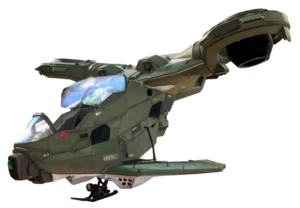
| |
| Production information | |
|
Manufacturer: |
|
|
Model: |
AV-14 |
| Technical specifications | |
|
Length: |
9.6 metres (31 ft)[1] |
|
Width: |
8.7 metres (29 ft)[1] |
|
Height: |
4.45 metres (14.6 ft)[2] |
|
Engine(s): |
Turbofan/turbojet engine |
|
Armament: |
|
|
Crew: |
One pilot |
| Usage | |
|
In service: |
|
|
Role(s): |
Close air support,[3] light troop transport, light anti-vehicle/personnel |
|
Affiliation: |
|
The AV-14 Hornet, more formally known as the AV-14 Attack VTOL, is a United Nations Space Command airborne assault vehicle.
Overview[edit]
Design details[edit]
The AV-14 is a vertical take off and landing vehicle (VTOL) that has been in service since the Insurrection,[5] at least as early as 2524.[6][7] It serves as the UNSC's primary assault, search and reconnaissance, and close air support aircraft. The Hornet is an atmospheric craft and as such cannot be deployed by orbital vessels unless a ship rated for atmospheric entry can deliver it to the battlefield. It is easier for the Hornet to be deployed from an air base located on the surface than from a ship.
The AV-14 Hornet consists of a one-man cockpit and a rear section, extending approximately one meter backward. Variant models feature a tandem seating configuration, presumably allowing a second passenger to operate the aircraft's weaponry or navigation systems.[8] At the top of this rear section are a set of wings with what appear to be advanced turbofan engines mounted on gimbals at the ends, providing the Hornet's main source of propulsion. The front of the Hornet contains a target acquisition and designation system which includes cameras and sensors. On each side of the cockpit is a jump-seat extending backward that doubles as a landing skid. These skids allow up to four passengers.[9]
Although the AV-14 Hornet primarily serves as an attack craft, the Hornet can be reconfigured for a number of other roles. For example, some AV-14s are configured as dedicated troop transports. These Hornets lack the Class-2 Guided Munitions Launch System equipped by the standard model in order to improve airspeed.[10]
Armaments[edit]
The AV-14 Hornet is armed with both anti-infantry and anti-vehicle weapon systems. The AV-14 Hornet can be configured with one of two anti-infantry systems. The first configuration contains two triple-barreled, fire-linked rotary cannons. These are located on either side above the cockpit on the leading edges of the wing. The guns fire synchronously, and can be elevated and depressed to a small degree, without affecting the flight pattern of the Hornet. The second is a single, nose-mounted GAU-23/AW/Linkless Feed Autocannon that fires .50 BMG ammunition.[7][11][12] The anti-vehicle system is composed of two Class-2 Guided Munition Launch Systems that are mounted on the ventral surface of the aircraft's landing skids. When triggered, each pod fires a single missile. Like the LAU-65D/SGM-151 missile pod, the Class-2 GMLS is capable of achieving a target lock. In addition the Hornet can be armed with two chaff pods to counter radar-guided missiles. These are copper nickel-coated glass fibers or silver-coated nylon fibers having lengths equal to half of the anticipated radar wavelength.[12]
Usage[edit]
The AV-14 Hornet is known for its efficiency in combat situations; its multi-purpose role allows the vehicle to take on a wide array of missions and can perform without any major problems. In its role as an attack craft the AV-14 is very effective at hunting down and destroying armor with relative ease; the homing Class-2 GMLS can take down the toughest Covenant armor in only a few strikes, making it the UNSC's prime choice for hunting down tanks, aside from the AV-22 Sparrowhawk. Its ability to engage infantry also makes the AV-14 both an offensive and defensive aircraft; the triple-barreled rotary cannons can destroy heavily armored and heavily shielded targets with little effort, and its ability to place itself in a stationary position to lay down cover fire while a larger craft retrieves fellow infantry also allows it to perform its role as a support craft. The firepower of the craft is a major asset when escorting other aircraft which could be susceptible to ground fire into dangerous territory. Its role as a support craft is further bolstered by its ability to easily insert small strike teams into combat situations.
While the AV-14 Hornet has a wide variety of roles and advantages, its greatest weakness is its light armor — making it susceptible to anything larger than small arms fire.[6] Although the Hornet is rather nimble, it lacks the maneuverability of the D77-TC Pelican and the AV-22 Sparrowhawk, which can occasionally be a liability in combat conditions. Infantry atop of vehicles landing skids are also at risk of taking enemy fire, as they have no protection at all, which is why the AV-14 Hornet is often used to insert small strike teams, but not to extract them, in combat operations.[7][13] The risk of casualties from anti-aircraft fire mandates the use of more heavily armored aircraft like the D77-TC Pelican or the UH-144 Falcon for extraction.
Variants[edit]
- 2531 Hornet: Deployed by the crew of the UNSC Spirit of Fire during the Harvest campaign through to the Battle of Trove, this variation has a large rotary cannon built into the nose of the aircraft, rather than the two guns on later models.[12]
- AV-14B Attack VTOL: Modified by the crew of UNSC Spirit of Fire for deployment against the Banished, this model is used for combat reconnaissance and surprise attacks on high-priority targets. The AV-14B is armed with medium autocannons that are effective against all targets, and are particularly adept at taking out light vehicles. It features a modified airframe that is considerably blockier in shape than the base model.[14]
- NMPD Hornet: An air support variant of AV-14 utilised by the New Mombasa Police Department. This variant is painted in black and white livery, and has blue and red lights.[15]
- Transport Hornet: A transport-orientated variant of the Hornet. This variant has the missile pods removed and a white paint coating.
Gameplay[edit]
- Main article: Hornet
The Hornet is a drivable vehicle in two games including Halo 3 and Halo 2: Anniversary. They are also units in Halo Wars and Halo Wars 2.
Trivia[edit]

|
See our gameplay information related to AV-14 Hornet on its gameplay page. |

|
Browse more images in this article's gallery page. |
- A hornet is an insect, in keeping with the UNSC's tradition of naming atmospheric vehicles after real animals with the exceptions of the GA-TL1 Longsword, B-65 Shortsword, F-41 Broadsword, and FSS-1000 Sabre, which are named after bladed weapons and are capable of space flight.
- The Hornet bears a slight resemblance to its namesake insect with the "wings" growing slightly wider towards the end (like a real hornet's wing) and with the personnel jump seats mimicking the long back legs that often trail behind the posterior of the insect.
- In Halo Wars, when the "Wingmen" upgrade is unlocked for the Hornet, the Marines sit on the wings instead of stand as they do in Halo 3, due to the scaling of the two units. Such scaling differences are common in real-time strategy games.
Gallery[edit]
A flight of Hornets deploy ODSTs into the occupied city of Cleveland on Earth in 2552 in Halo: Uprising.
An early Hornet concept for Halo 3, with a gunner being placed on the back. This idea was later abandoned.
The snow-camouflaged Hornet on the map Avalanche.
Concept art of the Hornet for Halo Wars.
A Hornet on Harvest.
Tandem-seater variant of the AV-14 Hornet as seen in Halo Legends: Homecoming.
A squadron of Hornets pursue Covenant forces during the Battle of Draetheus V.
A Hornet flying towards a city in Halo: Spartan Strike.
An AV-14B Hornet in the Halo Wars 2 Open Beta.
A Trooper AV-14B Hornet in the Halo Wars 2 - Blitz Beta.
Blitz card of a Trooper AV-14B in Halo Wars 2.
Title card art from a cut Halo Wars 2 mission featuring AV-14B Hornets and an AC-220 Vulture.
List of appearances[edit]
- Halo: Uprising (First appearance)
- Halo 3
- Halo: Contact Harvest
- Halo Wars
- Halo 3: ODST (Halo: The Master Chief Collection only)
- Halo Legends
- Halo: Evolutions - Essential Tales of the Halo Universe
- Halo 4 (Background only)
- Halo: Spartan Assault
- Halo: Mortal Dictata (Mentioned only)
- Halo 2: Anniversary
- Halo: Spartan Strike
- Halo: Last Light (Mentioned only)
- Halo 5: Guardians (Mentioned only)
- Halo Wars 2
- Halo: Legacy of Onyx
- Halo: Divine Wind
- Become
- Halo: Anvil Accord (Mentioned only)
Sources[edit]
- ^ a b c Halo: The Essential Visual Guide, page 96
- ^ Halo 3, 3D model data
- ^ Bungie.net: Bungie Weekly Update: 3/14/08
- ^ Halo: Last Light
- ^ Halo Legends, Origins
- ^ a b Halo Encyclopedia (2009 edition), page 248
- ^ a b c Halo: Evolutions - Essential Tales of the Halo Universe, "Dirt", page 113
- ^ Halo Legends, Homecoming
- ^ Halo: Contact Harvest, page 9
- ^ Halo 3, multiplayer level, Avalanche
- ^ Halo Wars
- ^ a b c Halo Wars: Official Strategy Guide, page 45
- ^ Halo: Contact Harvest, page 20
- ^ Halo Waypoint - Canon Fodder: The Art of War(s)
- ^ Megabloks - Police Air Support Hornet
| ||||||||
